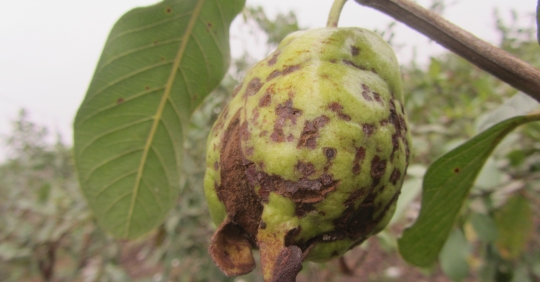Damage reduces fruit yield by 50%
Ms. Le Thi Hien from Hoa Muc Village, Hoan Long Township, Yen My (Hung Yen) said that she cultivated 1.5 acres (0.54 ha) of Taiwanese guava and last year 50% of the fruit crop compared to last year lost the previous year. At first she did not know the cause, only saw many withered, brittle and broken guava buds, even blossoms and young guava fruits. Ms. Hien had to spray a lot of pesticides so that the guava garden could harvest 15 tons of fruit, 15 tons less than 2021.
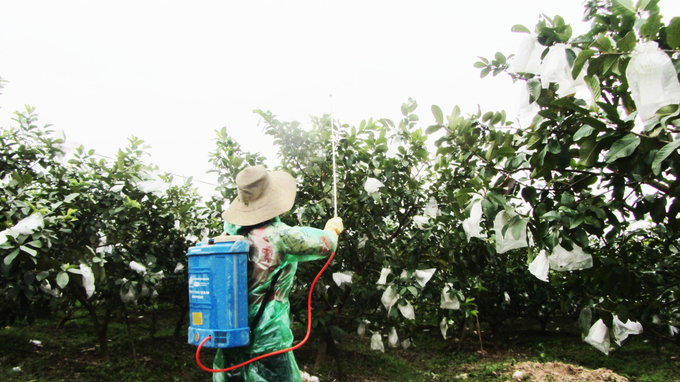
Farmers spray insecticides for the guava garden. Picture: HaiTien.
According to Ms. Hien, the 2022 guava harvest will see the fruit production of most of the guava plantations in this municipality drop by about 50%. Some households intensively grow guava as usual, after the bag is not sprayed with pesticides, the fruit has been lost. The most dangerous thing is that this beetle line sucks plant sap right at the time of flowering and bud development, which makes these parts not bear fruit, not develop leaves, so they cannot photosynthesize and synthesize nutrients in branches and trees, resulting in the death of branches or trees when the salt bug concentration is too high and spraying is not done in time.
A few months later, Ms. Hien suddenly remembered opening the guava intensive cultivation process that VietGAP from Hung Yen Agricultural Extension trained to know that her guava garden was bitten by mosquito bugs. This object rarely appeared before, so the gardeners were surprised and did not know. It was only after Ms. Hien announced this that people were busy looking for mosquito repellents to minimize the damage.
Ms. Nguyen Thi Vu (with Hoa Muc Village) also said that she planted more than 5 Sao Taiwan guava pears, harvested nearly 6 tons of fruit every year, in 2022 she received only 2 tons of fruit. Ms. Hien explained: In the past, only yellow flies, caterpillars and aphids caused damage to guava trees, so she only focused on preventing these objects. Unexpectedly, more green mosquito bugs now appeared with a very high density, which caused damage at the exact moment of flowering, fruiting and new buds, so Ms. Hien and everyone else could not keep up.
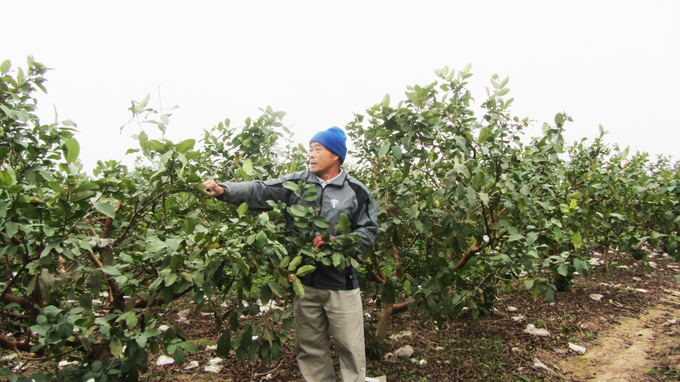
A guava garden is severely damaged by mosquito bugs. Picture: HaiTien.
Mosquito bugs don’t seem to only harm Taiwanese guava and pear trees in Hung Yen. Guava-specialist communities such as Dong Du (Gia Lam District) and Cu Khoi (Long Bien District, Hanoi) also experienced severe crop failures due to the stinging beetles sucking the juice and fruit.
Mr. Tran Van Dich in Group 1, Tho Block Village (Cu Khoi District) planted 3 acres of guava (commonly known as dong du guava) and also lost 50% of fruit production. According to Mr. Dich, households that sprayed pesticides in good time were also lost. Remarkably, many guava growers in Long Bien District still do not know what pests and diseases harm the guava, only when they see that the buds, flowers and young fruits are dry, they apply a mixture of pesticides, diseases and aphid spray. Although it reduces damage, it costs money and also pollutes the environment, affects the health of direct workers, …
prevention solution
Mr. Nguyen Van Nam, deputy director of Hung Yen Plant Protection Division, said: There have been few years when mosquito bugs seem to be damaging guava at such a high density as last year, 2022. Due to weather changes, pests and diseases cease to emerge in accordance with the law and are no longer harmful to familiar crops, but also do damage to many other plant objects. However, mosquito bugs are not difficult to control. In order to protect guava plantations from mosquito bugs, farmers must apply Integrated Pest Management (IPM) to guava trees according to the following procedure: “
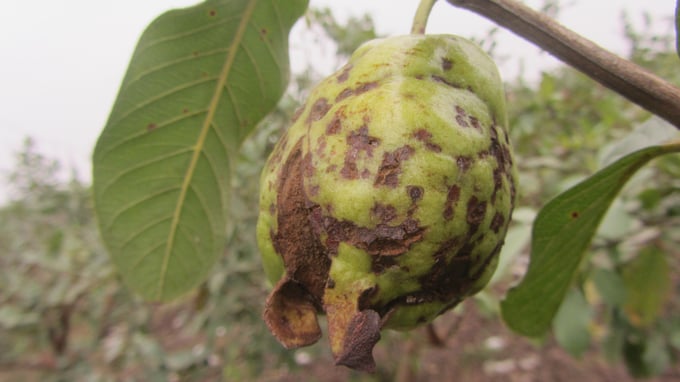
Taiwan guava pears are damaged by mosquito bugs. Picture: HaiTien.
– Cultural measures: do not apply too much nitrogen fertilizer, increase potassium fertilizer in the period of young shoots, flower buds and young fruit set. Regular pruning, removing weeds, branches, leaves and flowers, and diseased fruit are destroyed to limit the source of pest spread, provide ventilation for the garden, and reduce mosquito shelter. Visit the garden early morning or 5-6 p.m. daily, check the density of mosquito bugs in the period of young buds, young leaves, flowers and young fruits for timely spraying. Gather dried leaves and smoked plant residues in the evening to ward off harmful mosquito bugs.
– Biological measures: protection of natural enemies of mosquito bugs such as black ants, yellow ants, praying mantises, large spiders. Weaver ants (the most effective natural predator) feed on adult mosquito bug larvae, which can repel adults and prevent them from biting or laying eggs. If insect density is high, use parasitic fungicides Metarhizu anisopliae, Beauveria bassiana or Paecilomyces sp. Spray against young mosquito bugs.
– Chemical measures: only use pesticides if the pollutant content exceeds the economic threshold of 5% and drugs from the list of approved insecticides must be used according to the “four rights” principle. Some mosquito repellents such as citrus oil (MAP Green 6SL…), Alpha-Cypermethrin (Alfathrin 5EC, FM-Tox 25EC, Motox 5EC), Permethrin (Peran 50EC, Permecide 50EC). Use the medicine according to the instructions on the pack.
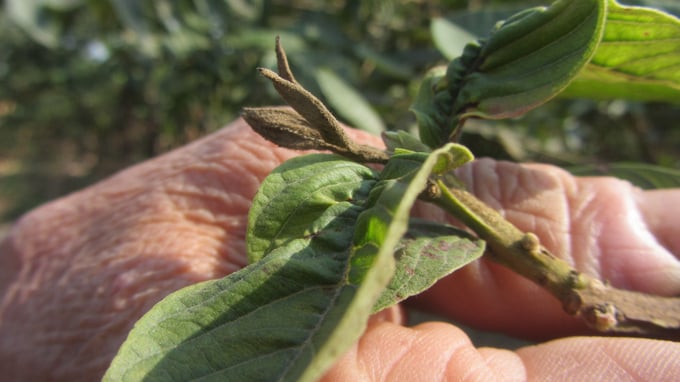
Mosquito bites suck withered guava buds. Picture: HaiTien.
It is best to spray in the early morning or cool afternoon when the tree is about to bloom, young buds, young leaves and young fruit. It is necessary to spray the room unless the weather is cloudy, the humidity is above 90%, the temperature is 25 – 28 degrees Celsius, as these are favorable conditions for the activity of mosquitoes. Note, do not spray when the plants are flowering, spray when the mosquito bugs are 1-3 years old for the highest efficiency; sprayed evenly over a large area around the garden in a spiral pattern; Select pesticides with contact or fumigation effects.
“It is predicted that mosquito bugs will continue to cause damage to guavas and many other crops. The district crop protection stations must closely follow the institutions that guide farmers to prevent this pest in time and effectively, to ensure no damage from pests and diseases to the crops in general, especially the guava,” the Hung Yen pointed out plant protection department.
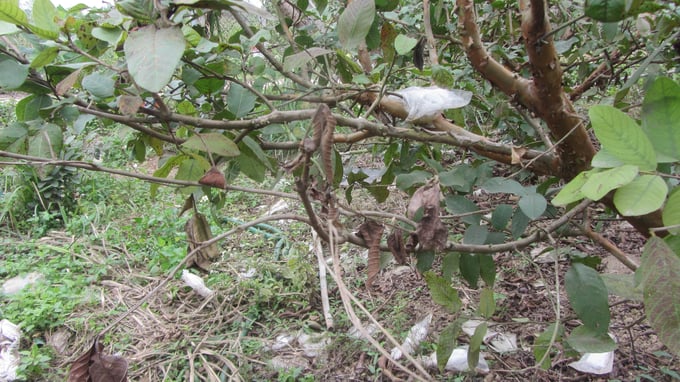
Guava branches are dried out by the bite of salt bugs. Picture: HaiTien.
“Mosquito bugs can live and cause damage all year round and are often active in the early hours of the morning and at dusk, hiding under foliage when it’s hot and active all day when it’s dark. Newly hatched mosquitoes live concentrated in young parts of trees, adults move slowly, preferring to live in groves and bushes.
Their saliva is very poisonous, when it stings plants, it first turns gray around the sting, then black, causing necrosis on young buds, young leaves, young fruits, forming scars and causing fruit deformation. , dead buds, twigs or the whole tree. Mosquito bugs not only cause direct damage, causing leaves, buds and young fruits to fall off, but also create conditions for the invasion of downy mildew, causing two,” said Mr. Nguyen Van Nam, deputy director of Hung Yen Plant Protection Subdivision . . .

